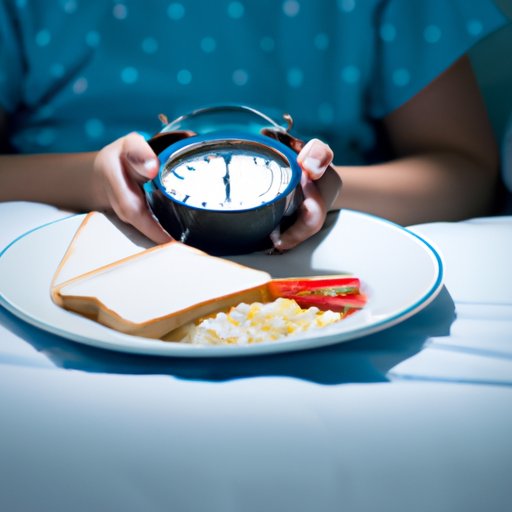Introduction
Late-night eating can be a difficult habit to break, but it’s important to recognize the potential benefits and dangers of eating close to bedtime. Eating late at night can interfere with digestion, lead to weight gain, and even disrupt your sleep. On the other hand, there are some potential benefits to eating earlier in the evening, such as improved digestion and better quality sleep.

Benefits of Eating Earlier in the Evening
Eating earlier in the evening has several potential benefits that make it worth considering as an alternative to late-night snacking. Here are a few of the advantages to eating earlier in the evening:
Improved Digestion
Eating earlier in the evening allows your body more time to digest your food before you go to bed. This can help reduce the risk of digestive problems such as indigestion, heartburn, and acid reflux. Eating earlier also gives your body time to absorb the nutrients from your food, which can help improve overall health.
Reduced Risk of Weight Gain
Eating late at night can cause weight gain because the body is not able to use the calories from late-night snacks as efficiently as it does during the day. Eating earlier in the evening allows your body to metabolize the calories more efficiently and reduces the risk of weight gain.
Better Quality Sleep
Eating too close to bedtime can disrupt your sleep due to the energy and mental stimulation associated with eating. Eating earlier in the evening allows your body to settle down and relax before going to bed, resulting in better quality sleep.
Healthy Alternatives to Late-Night Snacking
If you’re used to eating late at night, it can be difficult to break the habit. However, there are some healthy alternatives to late-night snacking that can help satisfy your cravings without disrupting your sleep or leading to weight gain.
Low-Calorie Snacks
Low-calorie snacks such as air-popped popcorn, celery sticks, or yogurt can help satisfy your late-night cravings without packing on extra calories. These snacks also provide some essential vitamins and minerals that can help promote overall health.
High-Protein Foods
High-protein foods such as eggs, nuts, or cottage cheese can help keep you full longer and prevent late-night cravings. They also contain essential amino acids that can help repair muscle tissue and promote growth and development.
Fresh Fruits and Vegetables
Fresh fruits and vegetables are excellent sources of vitamins, minerals, and fiber that can help keep you feeling full and satisfied. These snacks are low in calories and can help prevent unhealthy weight gain.
How to Avoid Cravings Before Bed
The best way to avoid late-night cravings is to practice mindful eating throughout the day. Eating regular meals and snacks throughout the day can help keep your blood sugar levels stable and prevent cravings later in the evening.
Drink Plenty of Water
Staying hydrated throughout the day can help prevent late-night cravings. Drinking plenty of water can also help flush out toxins and boost your metabolism, which can help you lose weight.
Avoid Stimulants
Caffeinated beverages, alcohol, and other stimulants can increase your appetite and lead to late-night cravings. Try to limit your intake of these substances to avoid late-night snacking.
Practice Mindful Eating
Practicing mindful eating can help you recognize when you’re truly hungry and when you’re just craving something to eat. Eating slowly and paying attention to your body’s signals can help you identify when you’re full and stop eating before you reach the point of over-eating.
The Dangers of Over-Eating Before Bedtime
Eating too close to bedtime can have serious consequences on your health. Here are a few of the dangers of over-eating before bed:
Unhealthy Weight Gain
Eating late at night can lead to unhealthy weight gain because the body is not able to process the calories as effectively as it does during the day. This can lead to an increase in body fat, which can increase the risk of obesity and other health problems.
Poor Sleep Quality
Eating too close to bedtime can disrupt your sleep due to the energy and mental stimulation associated with eating. This can lead to a decrease in the quality of your sleep, which can have a negative impact on your overall health.
Digestive Problems
Eating too close to bedtime can interfere with digestion and lead to digestive problems such as indigestion, heartburn, and acid reflux. Eating earlier in the evening can help reduce the risk of these problems by giving your body more time to digest your food.

Tips for Controlling Your Portion Sizes at Night
Controlling your portion sizes at night is key to avoiding unhealthy weight gain and other problems associated with late-night eating. Here are a few tips for controlling your portion sizes at night:
Set a Reasonable Bedtime
Setting a reasonable bedtime can help you avoid late-night cravings. Give yourself enough time to finish dinner and allow your body to settle down before going to bed.
Avoid Second Helpings
Trying to control your portion sizes can be difficult if you’re used to eating large meals. Avoiding second helpings can help you stick to smaller portions and prevent overeating.
Use Smaller Plates
Using smaller plates can help you control your portion sizes by making it easier to judge how much food you’re eating. This can help you avoid overeating and maintain a healthy weight.
Conclusion
Late-night eating can have both positive and negative impacts on your health. Eating earlier in the evening can help improve digestion, reduce the risk of weight gain, and improve the quality of your sleep. Healthy alternatives to late-night snacking include low-calorie snacks, high-protein foods, and fresh fruits and vegetables. Practicing mindful eating and drinking plenty of water can help you avoid cravings before bedtime. Finally, controlling your portion sizes at night can help you avoid unhealthy weight gain and other problems associated with late-night eating.


